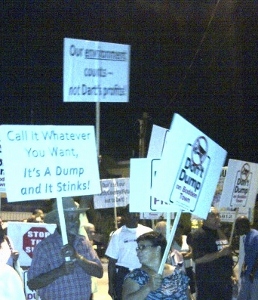Archive for March 15th, 2012

Budget credibility in question
 (CNS): The opposition leader has raised concerns about what is really going on with the country’s budget process after what he said was another puzzling move by government in the supplementary budget hearing this week. Alden McLaughlin said that the NRA money, which reappeared Tuesday having been kept off-balance in the original budget, demonstrates that government is making major financial decisions outside of Finance Committee. He queried what other issues are being handled this way, which was causing the whole budget process to losing credibility.
(CNS): The opposition leader has raised concerns about what is really going on with the country’s budget process after what he said was another puzzling move by government in the supplementary budget hearing this week. Alden McLaughlin said that the NRA money, which reappeared Tuesday having been kept off-balance in the original budget, demonstrates that government is making major financial decisions outside of Finance Committee. He queried what other issues are being handled this way, which was causing the whole budget process to losing credibility.
McLaughlin said the inexplicable move regarding $8 million that was not included in the original budget’s revenue predictions, which would have been earmarked for roads, raised a bigger question about what else was in the budget that was not being properly explained.
He said the return of this revenue to the books this week was not recorded in the news supplementary appropriation documents, and even after the committee meeting there was no real explanation about why government had kept the money out of the original budget.
“I have had to struggle with what this is all about after more than twelve years dealing with these things,” McLaughlin said as he noted the difficulties the man in the street may have with what was happening with the budget and government spending for this year.
The opposition leader said he could not say with any certainty what had gone on but he said it appeared the funds were initially withheld from this year’s original budget because of planned changes to the NRA’s structure and the possible privatization of road works.
He said the $8 million was not counted in government’s expected earnings and only around $600,000 had been allocated in the budget for the NRA, which was an unrealistic figure given that the authority is still legally responsible for road maintenance.
The mysterious move with the roads funding had led to Cabinet appropriating money directly to the authority each month, which McLaughlin said "all seemed a bit contrived", as he pointed to the lack of transparency.
The opposition leader said he had concerns that there could be other unorthodox accounting going on that was not as obvious as this particular move, which would mean that the opposition, and by extension the public at large, were simply unaware of and not able to query.
“What else was left out of this unrealistic budget?” he asked rhetorically. Although McLaughlin acknowledged the pressure on government to bring a budget last year within the tight parameters set by the UK, the opposition leader said the need to appropriate a further $50 million showed that the premier had still delivered a budget to the Legislative Assembly that he knew was unrealistic, further undermining the credibility of the entire process.
“There is no doubt that it’s very worrying,” the opposition leader added. “We are left to wonder if this is nothing more than a house of cards,” as he pointed to what government was now claiming would be an entire public sector deficit of $7 milllion.

LIME does battle with spike in data demand
(CNS Business): As a result of a massive local demand for data, telecommunications firm LIME says it needs to invest in network upgrades that will meet that demand and work is set to begin next month. The firm has admitted that a spike in use on the network has exceeded expectations and is affecting all the mobile services it provides. Aware of the troubles its customers are experiencing, the firm says it is doing all it can to assist and to get the upgrades completed as quickly as possible. LIME’s Cayman manager Tony Ritch said that although the firm has already made a significant investment in 4G, it is now experiencing what he described as an “unprecedented demand for mobile data”. Read more on CNSBusiness

GLF got $2M settlement
 (CNS): The actual settlement given to GLF Construction as a result of the premier’s decision to terminate talks with the developer over the cruise facilities is $2,093,750, according to the appropriation made on Tuesday at Finance Committee. Premier McKeeva Bush confirmed the speculation that the increase in the finance ministry budget for compensation from $605,000 to $2,698,750 was a direct result of the decision to settle with the firm outsideof court. He said the legal advice was it would be cheaper than going to trial, even if government could have defended and won the case. He added that the public purse would eventually be compensated as a result of the sale of ‘intellectual property’, the details of which he could not reveal, he said.
(CNS): The actual settlement given to GLF Construction as a result of the premier’s decision to terminate talks with the developer over the cruise facilities is $2,093,750, according to the appropriation made on Tuesday at Finance Committee. Premier McKeeva Bush confirmed the speculation that the increase in the finance ministry budget for compensation from $605,000 to $2,698,750 was a direct result of the decision to settle with the firm outsideof court. He said the legal advice was it would be cheaper than going to trial, even if government could have defended and won the case. He added that the public purse would eventually be compensated as a result of the sale of ‘intellectual property’, the details of which he could not reveal, he said.
Answering questions from the opposition leader regarding the change in expenditure for his own ministry, Bush, who was chairing a special sitting of Finance Committee, also revealed that the expected costs of the Spotts Jetty had doubled in price. Spelling out why he had decided to move from GLF to CHEC, he claimed the Beijing-based firm was going to give government more and in the end the country would be “way ahead” with that proposal.
“As far as our legal team was concerned, it was best to settle out of court … rather than go to court as we felt it would cost us more, even with a chance to win,” Bush said. “I took the decision to settle the matter. I believe the proposal that we have in front of us, where the dock is going to cost money to build that we don’t have and where GLF was not proposing to do certain things that we wanted done … being the Spots Jetty, which is between $6 and $8 million and the Turtle Farm, which we don’t have the money to do….”
Bush said that the redevelopment of the Turtle Farm had always been tied to the idea of a dock there, which was why the facility was costing government around $9 million in subsidy. He said the facility had been done with the support of the industry as Grand Cayman had needed more improved tourist amenities, but he said government would not have built it if the dock was not part of the deal as it would not have been able to get the people there.
“When I consider that we had worked out a programme with CHEC to build the Spots Jetty and to develop a facility at the Turtle Farm, that as far as we are concerned … even though we had to pay out $2 milllion, that puts us way ahead, that cost pales in comparison to $2 million of settlement that we agreed on.”
He said government would still be compensated as it would receive the same amount by the sale of the intellectual property, such as the framework agreement between GLF. He said the lawyers were dealing with it and it would be made public in time as to who was buying it but he couldn’t reveal the details yet.
Alden McLaughlin asked the premier if, given the settlement, this was a concession that the contract was wrongfully terminated.
“Well that was their position,” Bush said. “Even though we felt we could have won, it would have cost us much more to do battle in court. We decided we weren’t going that route … They held that they were wrongfully … we said ‘no’ … when it was all figured up it could cost probably $7 million or $5 million to settle with them if we went to trial …”
The premier also said that there were other reasons why he had chosen not to continue with GLF but he would not reveal those reasons but maybe it would come out in due course, he said cryptically as he went on to suggested he was being spied on.
“There is a tremendous amount of talk. There is even what I would term espionage going on because I certainly can’t go anywhere before I see two people with a camera following me up and down … and they are running around with petitions. They were people who were part and parcel of the local construction company … because they didn’t get the business they are doing their endeavour best to make this more than it is.”
Bush said that until such a time wherethat he could make things open, this was all he could say.

Former talk show host takes against free speech
 (CNS): Government backbencher Ellio Solomon appears to have been unnerved by objectors raising their opposition to government’s policy to relocate the country’s landfill to Bodden Town at a recent meeting. The former radio talk show host, once a staunch advocate for free speech, quizzed the police commissioner this week about the legality of picketers at the government-hosted UDP Bodden Town meeting last Thursday. Although Solomon seemed to struggle to articulate his point during Tuesday’s Finance Committee, he appeared to imply that the “large number of people shouting” and waving placards at a political meeting was wrong and they should have had police permission to shout.
(CNS): Government backbencher Ellio Solomon appears to have been unnerved by objectors raising their opposition to government’s policy to relocate the country’s landfill to Bodden Town at a recent meeting. The former radio talk show host, once a staunch advocate for free speech, quizzed the police commissioner this week about the legality of picketers at the government-hosted UDP Bodden Town meeting last Thursday. Although Solomon seemed to struggle to articulate his point during Tuesday’s Finance Committee, he appeared to imply that the “large number of people shouting” and waving placards at a political meeting was wrong and they should have had police permission to shout.
Commissioner David Baines told Solomon that the picketers on this occasion did not require permission to demonstrate as there was no procession and no disruption to the roads or the normal right of the public to go about its business. He said the demonstrators were merely exercising their lawful right to free speech and his officers had reported that there were no public order issues that night.
Solomon seemed to think, however, that the Coalition to Keep Bodden Town Dump Free needed police clearance to wave placards and chant during the meeting and he asked if the RCIPS had “a policy to allow these kinds of demonstrations at public meetings”, even when there were significant numbers. “It is a worrying development,” Solomon said about the picketers, who, he said, were deliberately trying to drown out the speakers.
During the meeting, which was billed as an update from government but which was more like a UDP political rally, Solomon was one of the speakers that had shouted over the protestors who were expressing their opposition to the landfill move and heckling him during his time on the platform.
Solomon said he was not launching an official complaint but he said the protestors were involved in an organised demonstration and so they should have had permission.
The police commissioner spelt out to him the position of law enforcement towards demonstrations. He said that provided there was no breach of the peace, people had a lawful right to express their opposition to something. “We are only concerned with public order and that does not interfere with the right of people to express themselves,” Baines said.
He explained that only rallies, marches or motorcades where significant numbers of people would be blocking the highway did organisers need to get police approval so officers could minimize the disruption to the wider public.